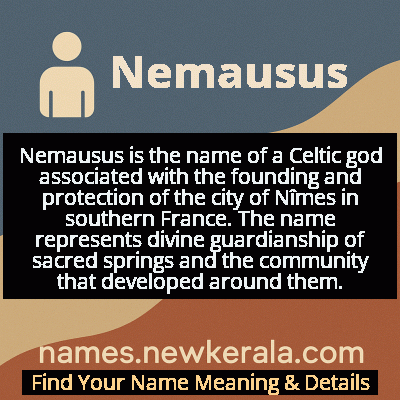Nemausus Name Meaning & Details
Origin, Popularity, Numerology Analysis & Name Meaning of Nemausus
Discover the origin, meaning, and cultural significance of the name NEMAUSUS. Delve into its historical roots and explore the lasting impact it has had on communities and traditions.
Name
Nemausus
Gender
Male
Origin
Celtic
Lucky Number
5
Meaning of the Name - Nemausus
Nemausus is the name of a Celtic god associated with the founding and protection of the city of Nîmes in southern France. The name represents divine guardianship of sacred springs and the community that developed around them.
Nemausus - Complete Numerology Analysis
Your Numerology Number
Based on Pythagorean Numerology System
Ruling Planet
Mercury
Positive Nature
Adventurous, dynamic, curious, and social.
Negative Traits
Restless, impatient, inconsistent, prone to indulgence.
Lucky Colours
Green, white.
Lucky Days
Wednesday.
Lucky Stones
Emerald.
Harmony Numbers
1, 3, 9.
Best Suited Professions
Sales, marketing, travel, entertainment.
What People Like About You
Versatility, charisma, adventurous spirit.
Famous People Named Nemausus
Nemausus (Mythological)
Celtic Deity
Patron god of the city of Nîmes, associated with healing springs and local protection
Nemausius
Roman Governor
Historical figure mentioned in Roman records from Gallia Narbonensis region
Saint Nemausus
Early Christian Martyr
Christian saint venerated in southern France, possibly named after the local deity
Name Variations & International Equivalents
Click on blue names to explore their detailed meanings. Gray names with will be available soon.
Cultural & Historical Significance
Extended Personality Analysis
Those bearing the name Nemausus are often characterized by a profound sense of responsibility toward community and tradition, reflecting the deity's role as protector of both people and place. They typically possess a calming, healing presence that others find reassuring, combined with steadfast reliability that makes them natural anchors in social or professional circles. Their personality blends practical wisdom with spiritual depth, often showing particular aptitude for roles that require both nurturing and leadership. While they may appear reserved initially, they reveal strong convictions and protective instincts when those under their care are threatened. This combination of gentle strength and historical consciousness makes them excellent custodians of knowledge, tradition, or institutions that require both compassion and firm guidance to thrive across generations.
Modern Usage & Popularity
Contemporary usage of Nemausus is predominantly historical and academic rather than as a personal name, though it experiences occasional revival in artistic and cultural contexts. The name appears in scholarly works about Gallo-Roman religion, local history publications in the Languedoc region, and occasionally in historical fiction set in ancient Gaul. While extremely rare as a given name, it has seen minor interest among parents seeking unique mythological names with strong regional connections, particularly in southern France. Modern applications also include business names in the Nîmes area, cultural associations, and educational programs focused on regional heritage. The name's usage trends reflect broader patterns of mythological name revival, though its specific geographic associations limit its widespread adoption compared to more universally recognized mythological figures.
Symbolic & Spiritual Meanings
Symbolically, Nemausus represents the life-sustaining power of water and the protective spirit of place, embodying how natural resources and spiritual beliefs intertwine to create lasting communities. The name carries metaphors of foundation and continuity—like the spring that flows consistently while the city around it transforms across millennia. It symbolizes the idea that true protection involves both physical sustenance and cultural preservation, with the healing waters representing both literal nourishment and metaphorical renewal. As a symbolic figure, Nemausus bridges the ancient and modern, reminding us that contemporary identities often rest upon deep historical foundations, and that the sacred can persist even as its manifestations change with time and cultural evolution.

